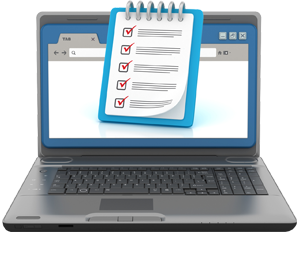Eight ideas to make filing your tax return easier
 Consider these suggestions for helping to make tax season smooth sailing this year for your small business:
Consider these suggestions for helping to make tax season smooth sailing this year for your small business:
- Make your estimated tax payments. Tuesday, January 18th is the due date to make your 4th quarter payment for the 2021 tax year. Now is also the time to create an initial estimate for first quarter 2022 tax payments. The due date for this payment is Monday, April 18.
- Reconcile your bank accounts. Preparing an accurate tax return starts with accurate books. Reconciling your bank accounts is the first step in this process. Consider it the cornerstone on which you build your financials and your tax return. Up-to-date cash accounts will also give you confidence that you’re not over-reporting (or under-reporting!) income on your tax return.
- Organize those nasty credit card statements. If you use credit cards for your business, develop an expense report for these expenditures, if you have not already done so. The report should recap the credit card bill and place the transactions in the correct expense accounts. Attach actual copies of the expenses in the credit card statement. You will need this to support any sales tax paid in case of an audit. Use this exercise to show you are only including business-related expenses by reimbursing your business for any personal use of the card.
- Reconcile accounts payable. One of the first tax deadlines for many businesses is issuing 1099 forms to vendors and contractors at the end of January. Get your accounts payable and cash disbursements up-to-date so you have an accurate account of which vendors you paid.
- Get your information reporting in order. Now identify anyone you paid during the year that will need a 1099. Look for vendors that are not incorporated like consultants or those in the gig economy and don’t forget your attorneys. You will need names, addresses, identification numbers (like Social Security numbers) and amounts billed. Send out W-9s as soon as possible to request missing information.
- File employee-related tax forms. If you have employees, file all necessary W-2 and W-3 forms, along with the applicable federal and state payroll returns (Forms 940 and 941). Do this as soon as possible in January to allow time to identify any potential problems.
- Compile a list of major purchases. Prepare a list of any purchases you made during 2021 that resulted in your business receiving an invoice for $2,500 or more. Once the list is compiled, find detailed invoices that support the purchase and create a fixed asset file. This spending will be needed to determine if you wish to depreciate the purchase over time, take advantage of bonus depreciation, or expense the purchase using code section 179. Your choices create a great tax planning tool.
- Review the impact of COVID-19. There are a number of federal and state initiatives that will need to be considered when filing your 2021 tax return. If you received payroll credits for employee retention or have a Paycheck Protection Program loan that needs to be accounted for this year, be prepared with the details. It will be important to correctly account for these funds.
In late 2020, the IRS announced that it will increase tax audits of small businesses by 50 percent in 2021. Here are several mistakes to avoid if you do get audited by Uncle Sam.
- Mistake: Missing income. A long history of investigating has led IRS auditors to focus on under-reported income. If you’re a business that handles cash, expect greater scrutiny from the IRS. The same is true if you generate miscellaneous income that’s reported to the IRS on 1099 forms. Be proactive by tracking and documenting all income from whatever source. Invoices, sales receipts, profit and loss statements, bank records—all can be used to substantiate income amounts.
- Mistake: Higher than normal business losses. Some small businesses struggle in the early years before becoming profitable. If your company’s bottom line never improves, the IRS may view your enterprise as a hobby and subsequently disallow certain deductions. As a general rule, you must earn a profit in three of the past five years to be considered a legitimate business.
 Mistake: Deductions lacking substantiation. Do you really use your home office exclusively for business? Does your company earn only $50,000 a year but claim charitable donations of $10,000? Do you write off auto expenses for your only car? The key to satisfying auditors is having clear and unequivocal documentation. They want source documents such as mileage logs that match the amount claimed on your tax return and clearly show a business purpose. If you can’t locate a specific record, look for alternative ways to support your tax return filings. In some cases, a vendor or landlord might have copies of pertinent records.
Mistake: Deductions lacking substantiation. Do you really use your home office exclusively for business? Does your company earn only $50,000 a year but claim charitable donations of $10,000? Do you write off auto expenses for your only car? The key to satisfying auditors is having clear and unequivocal documentation. They want source documents such as mileage logs that match the amount claimed on your tax return and clearly show a business purpose. If you can’t locate a specific record, look for alternative ways to support your tax return filings. In some cases, a vendor or landlord might have copies of pertinent records.- Mistake: No expense reports. If you use your credit card for business, create an expense report with account numbers and attach it to each statement. Then attach copies of the bills that support the charges. This is an easy place to blend in personal expenses with business expenses and auditors know it.
- Mistake: No separate books, bank accounts or statements. Never run personal expenses through business accounts and vice versa. Have separate bank accounts and credit cards. A sure sign of asking for trouble is not keeping the business separate from personal accounts and activities.
- Mistake: Treat the auditor as an enemy. Auditors have a job to do, and it’s in your best interest to make their task as painless as possible. Try to maintain an attitude of professional courtesy. If you’re called to their office, show up on time and dress professionally. If they come to your place of business, instruct staff to answer questions honestly and completely.